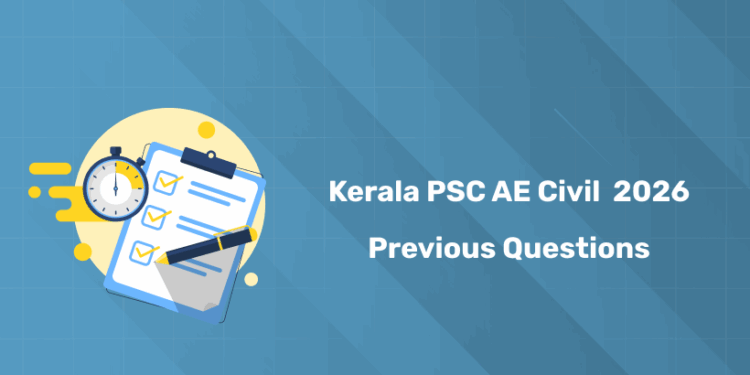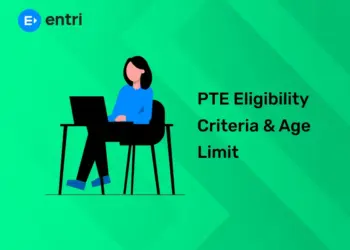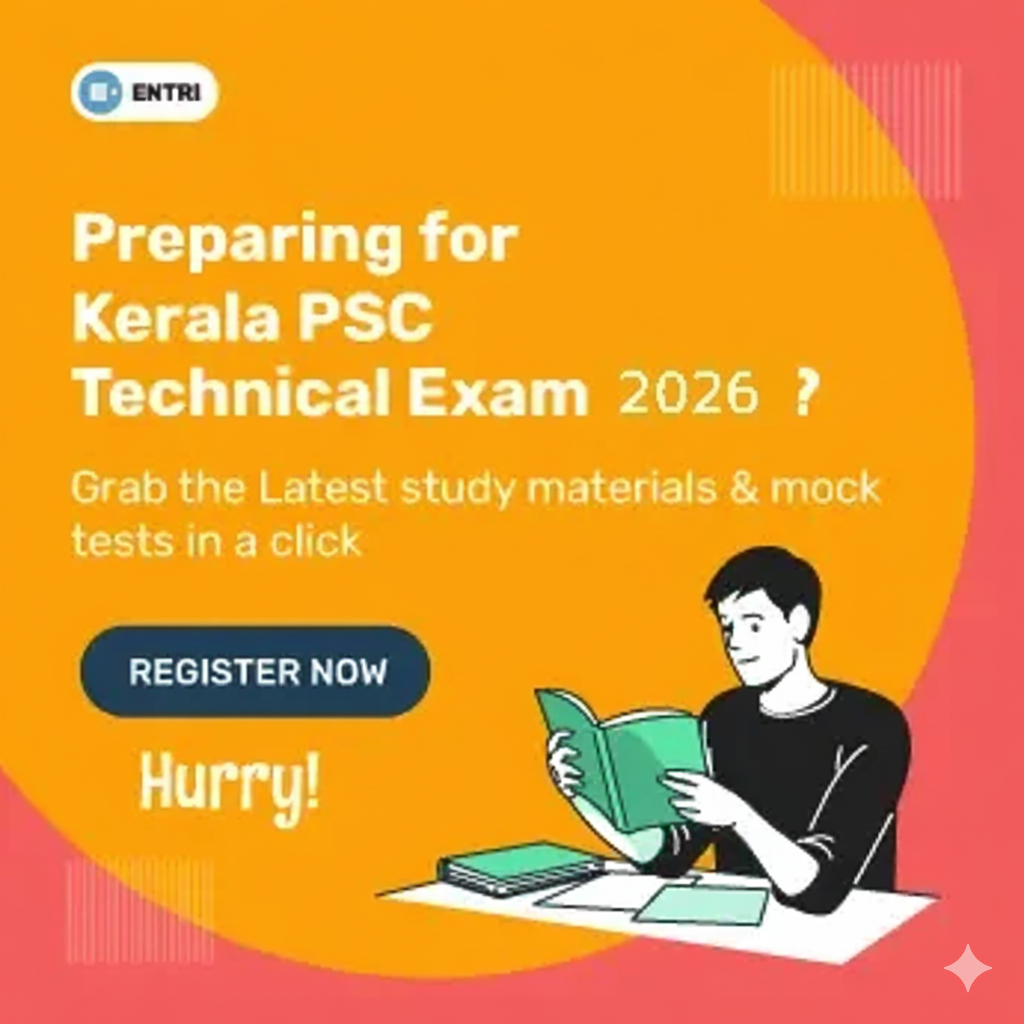Table of Contents
When preparing for an examination, one of the most important things to consider along with the syllabus is previous question papers. They help in understanding frequently repeated questions and identifying the exam pattern. Solving one or two question papers daily on a regular basis is a good practice. In this blog, Kerala PSC Assistant Engineer (Civil) 2026 previous year question paper PDFs are attached. Please download them.
AE CIVIL Technical Exams Notes!
Kerala PSC Assistant Engineer (AE) Civil Previous Question Paper 2026
Referring to previous year’s question papers will definitely take you one step ahead in your preparations for the examination. Solve question papers, check for the importance of topics, and schedule preparation accordingly!
Check below for previous year question papers
| Question Paper Name | Download PDF |
| 130/2015 | |
| 143/2015 | |
| 072/2016 | |
| 080/2025 |
Kerala PSC Assistant Engineer Civil 2026: Highlights
1: Between the period of 1858-1947, how many Viceroys ruled over India?
| Particulars | Details |
| Name of recruiting organization | Kerala Public Service Commission (PSC) |
| Name of department | Irrigation |
| Name of post | Assistant Engineer (Civil) |
| Category Number | 537/2025 & 538/2025 |
| Number of vacancies | As per Notification |
| Notification Release Date | December 15, 2025 |
| Exam Date | Notify Later |
| Admit Card | Notify Later |
| Mode of recruitment | Direct Recruitment |
| Mode of application | Online |
| Official website | keralapsc.gov.in |
Prepare for Kerala PSC Technical Exams with Entri
സർക്കാർ ജോലി എന്ന സ്വപ്നം ഇനി സ്വപ്നം മാത്രമല്ല! Join Kerala's Top-rated PSC Coaching Programs
Join NowWhy Kerala PSC AE Civil Previous Question Papers Are Important
Studying previous year question papers for the Kerala PSC Assistant Engineer (Civil) exam offers several advantages:
- Understanding Exam Pattern: Provide insight into the structure of the exam, including the number of questions, type of questions (objective, descriptive), and distribution of marks among different sections.
- Topic Familiarity: Identify recurring topics and prioritize their preparation accordingly. This helps in focusing on the most important subjects and avoiding unnecessary distractions.
- Time Management: Improve their time management skills. It helps in understanding which sections require more time and which can be solved quickly, thereby optimizing exam strategy.
- Self-Assessment: Helps candidates assess their strengths and weaknesses. It highlights areas where more practice or conceptual clarity is needed, enabling focused preparation.
- Exam Simulation: Replicate actual exam environment. It reduces exam anxiety and builds confidence by providing a real-time experience of solving questions within the stipulated time frame.
Kerala PSC Assistant Engineer (AE) Civil Exam Pattern 2026
It is very important to keep yourself acquainted with the exam pattern for better preparation for the examination. As we refer question papers for examination it is also important to be very familiar with the examination pattern as well. The pattern of Kerala PSC AE Civil 2026 examination is tabulated below.
| Parameters | Details |
| Type of the examination | Objective Type Multiple Choice |
| Exam Mode | Offline |
| Total Marks | 100 marks |
| Duration | One hour fifteen minutes |
| Medium | English |
Kerala PSC Assistant Engineer Civil Exam Pattern 2026 – Topic-wise Distribution
Aspirants have to be well updated with the syllabus of the examination, only then appropriate study plan can be prepared to boost preparation in the examination.
Following are the 8 main topics included in the syllabus of the KPSC AE Civil examination along with a brief description of each topic.
| Section | Marks |
|---|---|
| Mechanics of Solids and Structural Analysis | 10 Marks |
| Fluid Mechanics and Water Resources Engineering | 10 Marks |
| Surveying and Levelling, Quantity Surveying and Valuation | 10 Marks |
| Building Materials, Construction Technology, Construction Management | 20 Marks |
| Environmental Engineering | 10 Marks |
| Design of Structures | 20 Marks |
| Geotechnical Engineering | 10 Marks |
| Transportation Engineering and Urban Planning | 10 Marks |
| Total | 100 Marks |
How to Use Kerala PSC AE Civil 2026 Previous Year Papers Effectively
To maximize the benefits of studying previous year papers:
- Regular Practice: Allocate dedicated time slots to solve papers regularly.
- Review and Analyze: After solving, review your answers to understand mistakes and areas needing improvement.
- Create Exam-like Conditions: Set a timer and solve papers within the stipulated time to simulate exam conditions.
Prepare for Kerala PSC Technical Exams with Entri
സർക്കാർ ജോലി എന്ന സ്വപ്നം ഇനി സ്വപ്നം മാത്രമല്ല! Join Kerala's Top-rated PSC Coaching Programs
Join NowHow to Download Kerala PSC Assistant Engineer Previous Year Question Paper
To download Kerala PSC Assistant Engineer (Civil) previous year question papers:
- Visit the official Kerala PSC website: https://www.keralapsc.gov.in/.
- Navigate to the ‘Previous Question Papers’ section.
- Select the Year of exam.
- Find Assistant Engineer (Civil) previous year question paper
- Click on the link to download the question paper in PDF format.
- Save or print the downloaded file for your preparation.
| Kerala PSC AE Civil Exam Information Links | |
| Kerala PSC AE Civil Notification | Kerala PSC AE Civil Mock Test |
| Kerala PSC AE Civil Syllabus | Kerala PSC AE Civil Video Course |
| Kerala PSC AE Civil Exam Date | Kerala PSC AE Civil Study Materials |
| Kerala PSC AE Civil Application Form | Kerala PSC AE Civil Interview Questions |
| Kerala PSC AE Civil Vacancy | Kerala PSC AE Civil Job Profile |
| Kerala PSC AE Civil Admit Card | Kerala PSC AE Civil Salary |
| Kerala PSC AE Civil Study Plan | Kerala PSC AE Civil Preparation Tips and Tricks |
| Kerala PSC AE Civil Best Books | Kerala PSC AE Civil Result |
| Kerala PSC AE Civil Eligibility Criteria | Kerala PSC AE Civil Cutoff |
| Kerala PSC AE Civil Selection Process | Kerala PSC AE Civil Exam Analysis |
| Kerala PSC AE Civil Answer Key | |
| Related Courses | ||
| RRB Exams Coaching | RRB JE Online Coaching | SSC JE Online Coaching |
| SSC Online Coaching | UPSC Online Coaching | Bank Exam Coaching Online |










